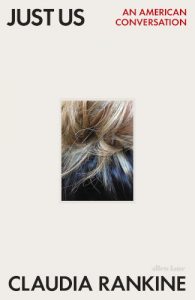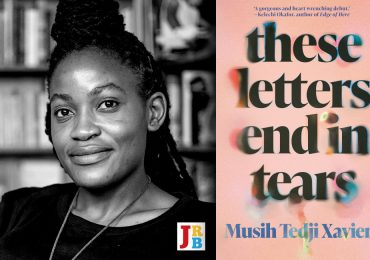Claudia Rankine’s Just Us is perhaps the most profound meditation on race and violence to emerge in the first two decades of this century, writes Wamuwi Mbao.

Just Us: An American Conversation
Claudia Rankine
Allen Lane, 2020
Claudia Rankine crafts generative literature, a kind of writing that endures with the reader for long moments. It is the kind of staying power that comes from a careful blend of knifing clarity and introspective patience. In a world where trauma places certain demands—that we act, that we act quickly—Rankine’s work sits with difficult, vexing questions in ways that shed new light on our social problems.
Rankine’s latest work, Just Us: An American Conversation, is an expansively thoughtful text that shifts itself away from the more inwardly directed register of 2014’s Citizen: An American Lyric to address itself to something that might be apprehended as whiteness in America. The poet and essayist has built a writing life out of paying attention to the endurance of Black life in the face of white America’s violence. Her characteristic form, honed especially in her 2004 book Don’t Let Me Be Lonely: An American Lyric, is a kind of essayistic wandering in which biography, critical theory, history and popular culture integrate in a rich proliferation of meaning. You’ve seen her work in the world—the lyric quality of something like Citizen lends itself to extraction—especially as state-endorsed violence against Black people in America has torn at that country’s myth of itself. When she says—
Because white men can’t
police their imagination
black people are dying
Rankine is tracking the persistent impoverishment of thought that bedevils living-together in America. Her work atomises the many layers of feeling that attend to scenes of social violence in which Black people are victimised or targeted or injured by the actions, careless or intended or both, of white people. She asks that we do not confuse the passage of time with the movement towards something better:
What if over tea, what if on our walks, what if
in the long yawn of the fog, what if in the long middle
of the wait, what if in the passage, in the what if
that carries us each day into seasons, what if
in the renewed resilience, what if in the endlessness,
what if in a lifetime of conversations, what if
in the clarity of consciousness, what if nothing changes?
Rankine gestures towards the book’s traction point: how are we to understand the violence of whiteness as something ongoing and deep seated? And what possibilities of change does whiteness choke and strangle through its terrible unwillingness to confront its meaning? Rankine wants to start a question that resists the consolation of the tidy resolution. Her aim is to bring discomfort to those who actively brush it off. She begins by unpacking—‘slowly’, she says—the concept of whiteness. Since being white is an invented form of being in the world that is of relatively recent emergence, what is at stake in taking up that identity?
This is compelling for several reasons. First, if being white was truly inhabited by an intentionality that leans towards the good, then America would not be the way it has been and continues to be. Second, it allows us to understand what is sacrificed when we privilege the comfort of white people in daily life: who accommodates? At whose expense does whiteness take up space even as it pretends invisibility? And what has been needed in order to separate the concept of American citizenship from the concept of being white in America? These are speculations that give context to the pathological contours of whiteness in American public life: this is how Reagan happens; this is how Trump happens.
Rankine thinks about how attachments to maintaining social control have become perversely normative, and wonders aloud about how such attachments shape and pervert justice:
What if you are responsible to saving more than to changing?
What if you’re the destruction coursing beneath your language of savior? Is that, too, not fucked up?
Just Us (the title draws from a Richard Pryor joke) is a conversation about violence, social justice, and what is required for forms of togetherness that are not hostile to Black life. Running to 335 pages with images and footnotes, it is a dense and entangling read. The materiality of the book bears mentioning. If Citizen was beguiling with its slender frame, gallery-guide paper and wrenching cover image, Just Us is a weightier and more mysterious object. The dust jacket is a white veil, its identifiers pushed to the margins, a window that simultaneously frames and obscures whiteness. How will I keep this clean, I wonder? What does it mean? Beneath the jacket, a sliver of red bleeds. Some thought went into this.
Rankine favours the entry point of the personal encounter, usually in some shared social scene like an airport or a dinner party or a parent-teacher meeting. Sometimes her interlocutors are friends, and sometimes they are strangers. At times, the conversation is an imagined one, thwarted by what lies between her and the person she wishes to address herself to. Or thought blooms out of inchoate feeling—dissatisfaction, frustration—when a conversation is blocked off or deadened by rote:
You say and I say but what
is it we are telling, what is it
we are wanting to know about here?
She longs for a different kind of conversation, ‘a swerve in our relation and the words that carry us’, some movement towards care and mutuality. In one scene, a friend tells her that his not getting a job is a sign that ‘as a white male, he was absorbing the problems of the world’. How many of us have borne such opining and wondered what the mendacity demanded of us in reply? There is, in Rankine’s estimation, an expectation of the world that is being articulated, and we have often heard or had to witness that expectation being couched or made visible in the world, depending on how aggrieved the white person levelling it feels about how they are being treated. Reading this, I recalled Hilton Als writing about the work of Richard Pryor and saying ‘for black people, being around white people is sometimes like taking care of babies you don’t like, babies who throw up on you again and again, but whom you cannot punish, because they’re babies. Eventually, you direct that anger at yourself—it has nowhere else to go.’
Rankine is at pains to grapple with such moments, where a particular response is being sought, even if it is not articulated:
I knew that my friend was trying to communicate his struggle to understand the complicated American structure that holds us both. I wanted to ask him if his expectation was a sign of his privilege but decided, given the loss of his job opportunity, that my role as a friend probably demanded other responses.
Proximity does strange things to the encounter with racism. Rankine muses on what allowances are expected of her in such a situation? What happens when intimacy and knowing—being someone’s friend or their partner—tangles with the distancing effect engendered by white expectations of the world? By placing these encounters in relation to one another, Rankine creates a perturbing scene of reading: what do you allow? What do you expect of others?
Some of those others might be close to home. One of the most moving sections of this collection deals with Rankine’s experience of feeling alienated from her husband. The couple end up in marriage counselling, and their relationship teeters on the brink. Her husband, a white man like the white men she found herself watching and listening to, begins to be inseparable from a long history of hurt. ‘My own interracial marriage’, she says in a chapter that riffs off Beyoncé’s excoriating truth-telling album Lemonade, ‘also existed inside a racist America whose ways make life more difficult.’ The couple find a way to endure, but the injury cannot be wiped away.
To think through affect in the way that Rankine’s oeuvre does, is to journey with emotions that jostle and even coincide in the uncanny moment of vulnerability. Where Citizen was cried-out and washed through in its confessional language, Just Us allows a wry grimace that approaches humour to play at the edges of its story. Faced with a parent-teacher meeting at her daughter’s predominantly white school, she thinks of wanting the best for her child:
… and I think, if her white father goes on his own, her teachers’ unconscious racial bias won’t be triggered by me to land on her. Oh God. Oh God. Oh God.
This moment sits alongside another story, where a white man waiting to board the same aeroplane expresses his frustration that his son has not (for the moment) been accepted to Yale, where Rankine teaches. ‘It’s tough,’ he says, ‘when you can’t play the diversity card’, and this too places a dilemma before her:
Was he thinking out loud? Were the words just slipping out before he could catch them? Was this the innocence of white privilege? Was he yanking my chain? Was he snapping the white-privilege flag in my face? Should I have asked him why he had the expectation that his son should be admitted early, without delay, without pause, without waiting? Should I have asked how he knew a person of color ‘took’ his son’s seat and not another white son of one of these many white men sitting around us?
Over several pages, as Rankine ponders and then enacts a difficult conversation with this man (where the difficulty initially rests with her), we see how what seems casual to her interlocutor is actually deeply messy, and this messiness resists dislodging.
Rankine’s writing is calm, poignant and unflappable even as it takes us to ugly moments and horrible memories. Remembering an incident of a cross burning on campus when she was a student, what she lingers with instead is the reaction of her white friends. What do they remember? How did they react? What did it mean to them and where did they place it in their memories?
The sad truth at the heart of Rankine’s book is that Black people are subject to an unfreedom both juridical and social. It cannot be unseated, as impatient post-racial hokum would have it, by learning to think of oneself in a different way. This unfreedom that expresses itself in violent policing, in systemic inequality and in the ambivalence towards hateful supremacist bigotry, drags us back to the same story of pain and suffering, as though we have no other stories that we might tell.
How do you write towards the truth of this annihilating life? There is a temptation, in such writing, to reach towards the messianic. James Baldwin cauterised a way of writing that, whether enraged or grief stricken or something in the blur of those feelings, sought to persuade white America that it could be better. Rankine, particularly in Just Us, writes without prescription.
***
What does it do to you to be the subject of someone else’s imaginative impoverishment? Just Us asks us to consider the ways racism interdicts life’s rhythms. The book sits with intractable states—puzzlement, disbelief, confusion—and in so doing, becomes a work of witness, where witnessing does the labour of justice in a bloodsoaked society. As such, Just Us is perhaps the most profound meditation on race and violence to emerge in the first two decades of this century, and essential reading for thinking about our collective moment.
- Editorial Advisory Panel member Wamuwi Mbao is an essayist, cultural critic and academic at Stellenbosch University. Follow him on Twitter.





